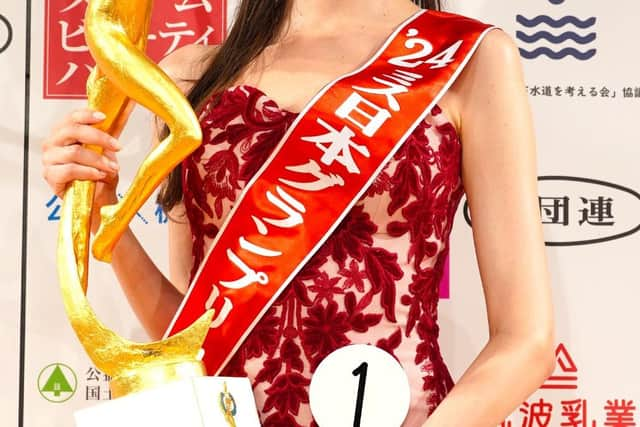Why Japan’s difficulty in accepting a white beauty queen is indicative of a wider problem
The winner of this year’s Miss Japan contest, Carolina Shiino, was particularly emotional when she accepted her award – even for a beauty queen.
“There have been racial barriers, and it has been challenging to be accepted as Japanese,” said the first naturalised citizen to win the title. Her point was proven almost immediately.
Advertisement
Hide AdAdvertisement
Hide Ad“This person who was chosen as Miss Japan is not even a mix with Japanese, but 100 per cent pure Ukrainian,” said one observer on X. “Understand she is beautiful, but this is 'Miss Japan'. Where is the Japaneseness?”.


The irony is Ms Shiino is Japanese – and very much considers herself to be. Born in Ukraine, she moved to Japan when she was five and grew up in Nagoya after her Ukrainian mother married a Japanese man. She speaks apparently flawless Japanese and was formally naturalised last year.
She is not the first winner of the accolade to spark controversy due to her ethnicity. Ariana Miyamoto, who was crowned Miss Japan in 2015, had a Japanese mother and African American father, raising questions among Japanese citizens as to whether someone who was mixed race should be eligible for the prize.
Japan has an unusually low level of immigration, making it one of the most racially homogenous of the G20 nations.
At the end of June 2022, there were 2,760,635 foreigners residing in Japan – just 2.2 per cent of the country of 125 million people. Around 40 per cent of these come from neighbouring China and South Korea. By contrast, in Scotland, the proportion of residents who were not born in the UK comprises 7.7 per cent.
Japan’s racism record is also less than squeaky clean. In 2018, the United Nations Committee on the Elimination of Racial Discrimination said 40 per cent of 4,000 surveyed foreign nationals in Japan said they could not access housing simply because they were foreign nationals, while 25 per cent had been refused employment for the same reason. Muslims, the committee said, were often ethnically profiled in Japan.
In many areas of Japan, foreigners cannot work in public sector jobs. It is a decision for local governments, but many impose such restrictions based on the central government's official view from 1953, which said public servants must possess Japanese nationality.
The UN report also raised ongoing issues surrounding discrimination against the Okinawa people, an island off Japan occupied by America from 1945 to 1972. Although now a prefecture of Japan, it still suffers economically and people there are often stereotyped as speaking improper Japanese.
Advertisement
Hide AdAdvertisement
Hide AdMeanwhile, the report warned advocacy groups had reported ongoing “widespread discrimination” in employment, marriage, housing and property assessment against the Burakumin people, an historically “untouchable” class dating back to the feudal era.
A wariness of foreigners is an issue that has isolated Japan in many ways, both culturally and physically. Yet it is not a view that every Japanese person holds.
Ai Wada, the organiser of the Miss Japan Grand Prix pageant, stood by the decision to crown Ms Shiino, saying she speaks and writes in “beautiful and polite Japanese". She said: "She is more Japanese than we are."
Comments
Want to join the conversation? Please or to comment on this article.
